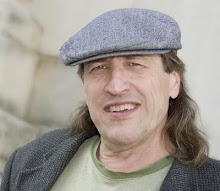January 16, 1987
It isn’t too cold today. But I’m so out of shape that I
can’t jog far when I try, huffing and puffing even before I get to the Monroe
Street Bridge, a merely four city blocks from where I started.
I’m tempted to cross back, over the rail bridge and come
back home through the park.
But I’m a little put off by the homeless people camping
there, even though it is the shortest way back.
I huff and puff for another four blocks, walk three, run
two, and reach the Dunkin Donuts at Outwater Lane where I buy coffee (but no
donut) and walk the whole way back to Monroe Street sipping the coffee.
Worn out by the exertion, I cross over the rail bridge
anyway, figuring I might be able to escape the homeless and their constant
begging, and get home.
I almost make it, too, when I see him – a familiar face
among the walking dead, although older than when I knew him in high school,
looking older than he had a right to look considering we are the same age.
Worse, he sees me and remembers, and refuses look me in the
eye.
I go up to him.
He tells me to go away.
I tell him no, and join him on the other side of tin can
fire the homeless use here to keep warm. But they don’t keep it ablaze, adding
only enough wood to keep the coals going at the bottom.
“You have a cigarette?” he asks me, his hands shaking as he
forms the v between forefinger and middle finger in anticipation of a smoke.
“No,” I say. “I don’t smoke. Do you want me to find more
wood for the fire?”
“No,” he says, glancing around. “I don’t want it too high. I
nod off sometimes, and the fire spreads. Then the cops come. We’re not supposed
to be here.”
“But if you don’t have anyplace else to go…” I say and then
stop.
“Oh, they have a place for us. They usually take me to the
police station first, and if they can’t find me a bed in a shelter, I stay
there. It’s warm. But it’s not comfortable. It’s worse when they do. Then I get
grilled by a social worker who always wants to know why I prefer being out here
and not in a shelter.”
“It’s a natural question,” I say.
He gives me a dirty look, and then mumbles about telling
them how he hates rules, and how they always tell him every place has rules.
“Not this place,” he says to me, warming his hands over the
top of the can where there is very little heat. “Well, not many rules anyway.
God, I hate the cold. I just hate being contained more. I had a job once, but
the boss treated me so bad I told him I’d starve before I kept feeding his
damned time clock.”
He blows on his hands. The nails are nearly black from
either dirt or injury, I can’t tell which.
“People are always looking down on me,” he goes on. “Some
people think I kind of deserve it. One time some bastard kids even tried to set
me on fire while I was asleep. I don’t sleep much now because of that. I don’t
have anything to steal. They just did it out of meanness.”
He looks over the top of the can at me, his dark eyes filled
not with pain but rage.
“people are always asking me how I got here and why I didn’t
want to get back to where I was. But to tell you the truth, I’ve spend most of
my time trying to forget all that. Now I’m not exactly sure what I did, only
that I didn’t want to be there any more.”
He glances over at a pile of rags, and a collection of odd
things that someone had obviously thrown away.
“When I do sleep, I sleep there,” he says and points at his
makeshift bed. “It’s tough enough getting myself up each day, especially on
cold days like this. It’s tough finding enough to eat and staying warm until I
can lay down again. I can’t be bothered trying to remember anything else. But
on some mornings, when I see the ice dripping from the limbs of trees like
today, I remember something, even if I don’t quite remember what.”
I don’t ask him any more questions. For a long time, we just
stand there warming ourselves over a fire that isn’t a fire anymore and doesn’t
produce heat enough to keep my fingers or toes warm. Then, I dig in my pocket
and come out with the change I have left over from buying my coffee, and I dump
it all – unasked for – into the palms of his dirty hands. Then, I head back
home to a cold water flat that isn’t warm either, but it’s home, and I’m
grateful for it, even if I do feed the boss’ time clock to keep a roof over my
head.















